How to Determine the Right Portion Sizes for Ferrets

Determining the right portion sizes for ferrets is crucial for their health and well-being. By understanding their dietary needs and the factors influencing portion sizes, you can ensure your furry companion receives the optimal amount of food.
By monitoring your ferret's weight and activity level, you can adjust portion sizes accordingly to maintain a healthy balance. Additionally, consulting with a veterinarian specializing in exotic pets can provide valuable insights into your ferret's specific dietary requirements.
Understanding Ferret's Nutritional Needs
Ferrets require a diet that's high in protein and fat to meet their unique nutritional needs. Achieving a proper nutritional balance is crucial to ensure their well-being. Protein is essential for muscle development and energy, while fat provides a concentrated source of calories vital for their metabolism. In the wild, ferrets are carnivores, primarily consuming animal-based proteins and fats, making it imperative to mirror this diet in captivity.
Understanding their dietary requirements is fundamental. Ferrets have a fast metabolism and short digestive tract, necessitating frequent meals throughout the day. Feeding them 4-6 small meals daily aligns with their natural feeding habits and aids in maintaining their energy levels. Establishing a consistent feeding schedule is beneficial for their digestion and overall health.
It's recommended to provide a high-quality, commercially available ferret food to ensure they receive the necessary nutrients. By adhering to these guidelines, ferret owners can support their pets' health and vitality.
Factors Influencing Portion Size
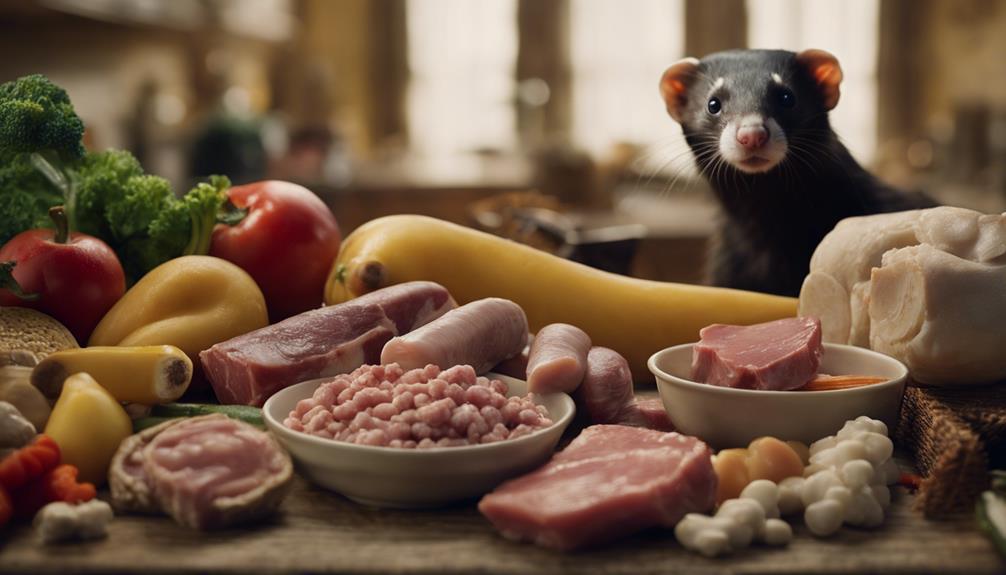
When determining portion sizes for ferrets, it is essential to consider their individual metabolic rates and activity levels. These factors play a crucial role in determining the appropriate amount of food to provide for your pet. Metabolic rates can vary among ferrets, influencing how quickly they process nutrients and energy. Likewise, activity levels impact how many calories a ferret needs to consume to maintain a healthy weight. By understanding these factors, you can adjust portion sizes accordingly to meet your ferret's specific needs.
| Factors Influencing Portion Size | |
|---|---|
| Metabolic Rate | |
| Activity Level | |
| Age | |
| Health Condition | |
| Feeding Schedule |
Influence on portion control is significant when considering the overall well-being of your ferret. It is crucial to factor in these elements when determining the right amount of food to offer. Additionally, establishing a consistent feeding schedule can help regulate portion sizes and maintain a healthy diet for your ferret. By carefully monitoring these influences, you can ensure that your ferret receives the appropriate nutrition for its individual needs.
Guidelines for Feeding Juvenile Ferrets
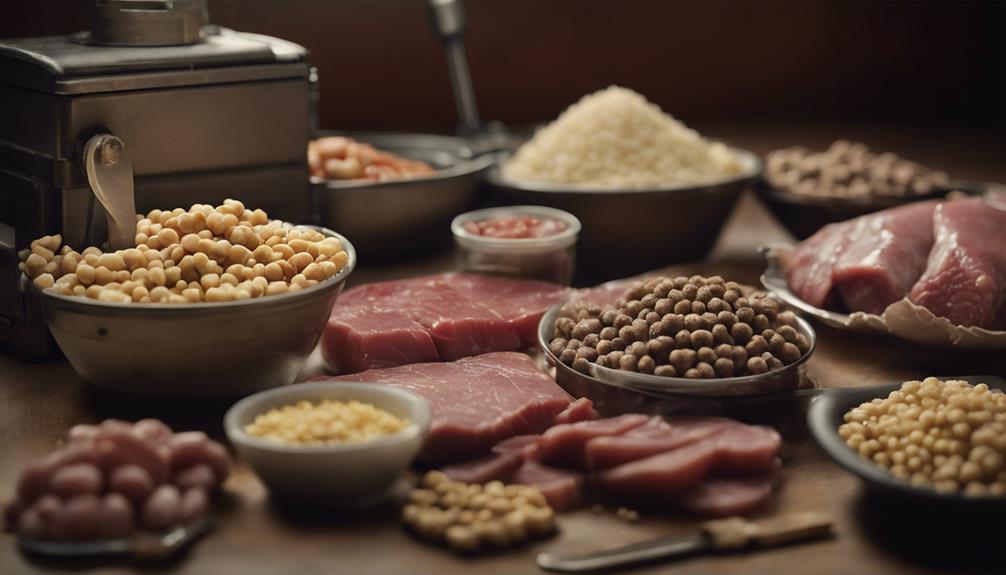
Considering the specific nutritional requirements of juvenile ferrets is essential when establishing feeding guidelines for this developmental stage. Juvenile ferrets are in their growth stages, requiring a diet rich in proteins and fats to support their rapid development. High-quality kitten food or specially formulated ferret food should be the primary components of their diet to meet their nutritional needs effectively.
Feeding frequency is crucial for juvenile ferrets. They have high energy levels and fast metabolisms, necessitating frequent meals throughout the day. Ideally, juvenile ferrets should be fed 4-6 small meals daily to maintain their energy levels and support growth.
Meal times are also significant for juvenile ferrets. Providing meals at consistent times each day helps establish a routine and prevents erratic eating habits. It's recommended to feed juvenile ferrets at regular intervals, spacing out meals evenly to ensure they receive a balanced diet and proper nutrition during this critical growth phase.
Recommended Portion Sizes for Adult Ferrets
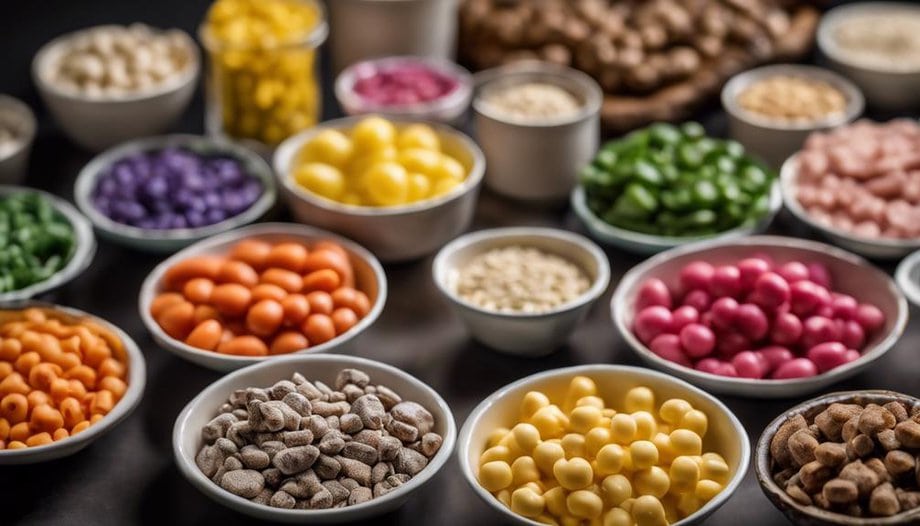
To determine appropriate portion sizes for adult ferrets, assess their individual weight, activity level, and overall health status. Adult ferrets generally require about 70-100 calories per 2.2 pounds (1 kg) of body weight per day. It's important to consider the quality of the diet as well. Adult ferrets need a diet high in protein to support their energetic nature and maintain muscle mass. Protein should make up around 30-40% of their diet.
| Nutrient | Daily Requirement | Food Sources |
|---|---|---|
| Protein | 30-40% of diet | Meat, eggs, high-quality ferret food |
| Fat | 15-20% of diet | Fatty acids, meat |
| Carbohydrates | Limited | Vegetables, fruits in moderation |
When giving ferret treats, remember the importance of portion control. Treats should not exceed 10% of their daily caloric intake. It's crucial to maintain a balanced diet to prevent obesity and nutritional deficiencies in adult ferrets.
Adjusting Portions for Senior Ferrets
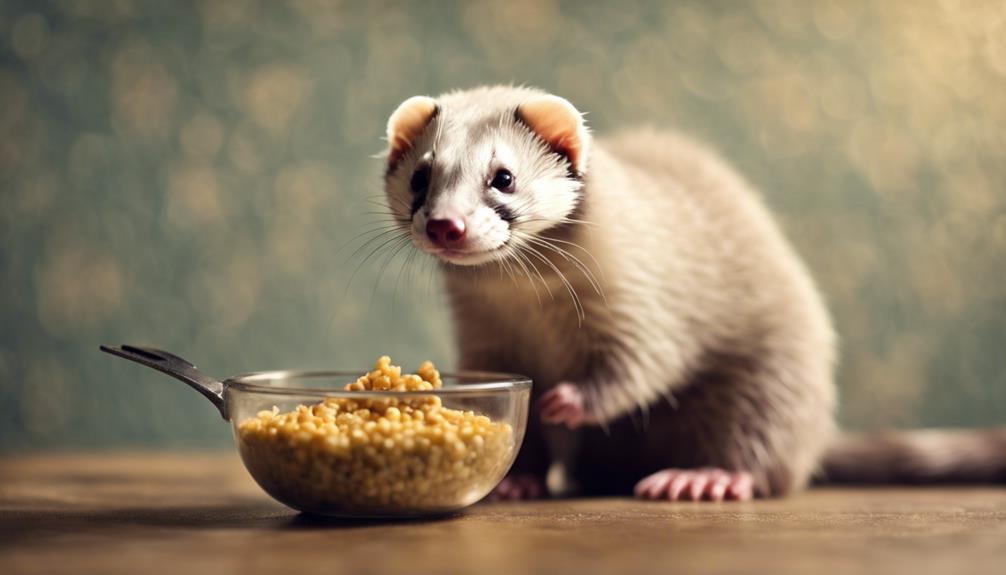
Ferret owners should adjust the portion sizes for senior ferrets based on their age-related changes in metabolism and activity levels. Senior ferret care requires careful consideration of dietary changes to meet the evolving needs of aging ferrets. As ferrets grow older, their metabolism tends to slow down, leading to decreased energy requirements. Consequently, portion adjustments are necessary to prevent obesity and maintain optimal health in senior ferrets.
Aging ferrets may also experience changes in their activity levels, becoming less active compared to younger counterparts. Accordingly, reducing portion sizes can help prevent weight gain and associated health issues. It's essential to monitor senior ferrets closely and make gradual adjustments to their portion sizes as needed.
Monitoring Weight and Portion Control
Ferret owners should weigh their pets regularly to ensure accurate monitoring of their weight. By adjusting portions as needed based on weight fluctuations, owners can maintain their ferrets' health.
Close monitoring of food consumption is essential to prevent overeating and promote proper portion control.
Weigh Regularly for Accuracy
Regularly monitoring the weight of your ferret is essential for maintaining accurate portion control. By conducting regular weigh-ins, you can ensure that your ferret is receiving the appropriate amount of food tailored to its specific needs.
Start by using a digital scale designed for small animals, and weigh your ferret at the same time each day for consistency. Record these measurements to track any fluctuations. Monitoring weight changes will help you adjust portion sizes accordingly, preventing overfeeding or underfeeding.
Remember that factors like age, activity level, and health conditions can influence your ferret's weight and food requirements. By staying diligent with regular weighing, you can optimize portion accuracy and contribute to your ferret's overall well-being.
Adjust Portions as Needed
To ensure optimal portion control and weight management for your ferret, closely monitor its weight fluctuations and adjust food portions accordingly. Portion adjustments should be made based on the individual ferret's dietary needs and age factors. Below is a practical table to guide you in determining the appropriate portion sizes for your ferret:
| Age of Ferret | Recommended Daily Portion |
|---|---|
| Baby | 1-2 tablespoons |
| Young Adult | 2-3 tablespoons |
| Adult | 3-4 tablespoons |
| Senior | 2-3 tablespoons |
| Overweight | 1-2 tablespoons |
Monitor Food Consumption Closely
Keeping a close eye on your ferret's food consumption is essential for effectively monitoring weight and portion control. Ferrets have specific food preferences, so observing what they enjoy can help determine appropriate portion sizes. Behavioral cues, such as increased or decreased appetite, can also guide portion control decisions. To monitor food consumption closely, consider the following:
- Observe Eating Habits: Watch how your ferret eats and adjust portion sizes accordingly.
- Track Weight Changes: Regularly weigh your ferret to ensure they're maintaining a healthy weight.
- Consult a Vet: If unsure about portion sizes, seek guidance from a veterinarian.
- Use Measuring Cups: Measure out food portions to avoid overfeeding.
- Experiment with Treats: Limit treats and monitor how they impact your ferret's overall food intake.
Consulting a Veterinarian for Advice
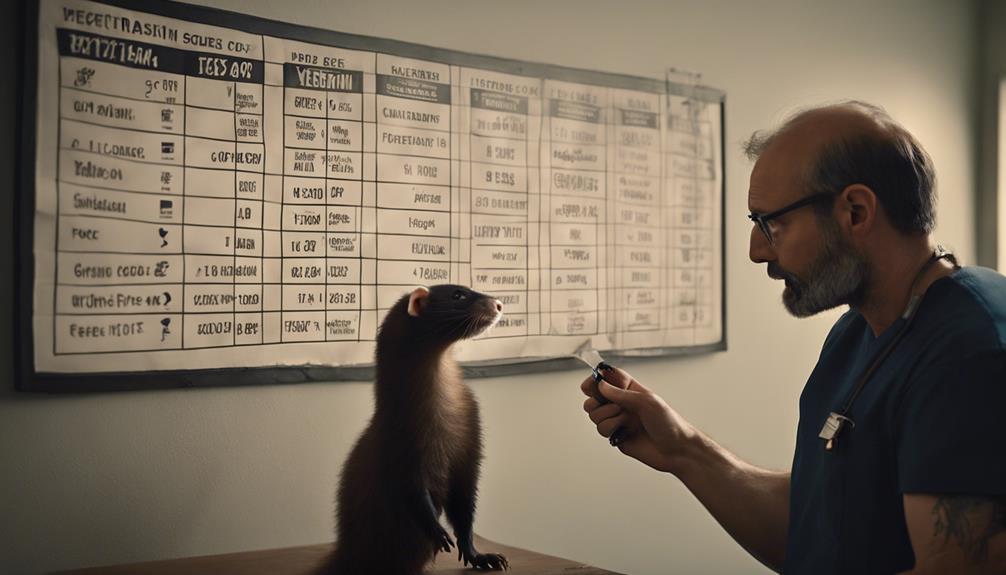
When determining appropriate portion sizes for ferrets, consulting a veterinarian for advice is crucial. Veterinarians can provide tailored dietary recommendations based on the specific needs and health conditions of individual ferrets.
Additionally, they can offer valuable tips on monitoring the health and weight of ferrets to ensure they're receiving proper nutrition.
Vet's Dietary Recommendations
Consulting a veterinarian for dietary recommendations is crucial for ensuring the optimal health and nutrition of ferrets. Veterinarians can provide tailored advice based on the specific needs of your ferret. When seeking dietary recommendations for your ferret, consider the following:
- Balanced Diet: Ensure your ferret's diet is balanced in proteins, fats, and carbohydrates.
- Ferret Treats: Limit the number of treats given to prevent dietary imbalances.
- Feeding Frequency: Follow your vet's advice on how often to feed your ferret.
- Nutritional Supplements: Discuss with your vet if your ferret needs any additional supplements.
- Weight Management: Monitor your ferret's weight regularly and adjust the diet as needed to maintain a healthy weight.
Health Monitoring Tips
Regular health monitoring of ferrets is essential for their overall well-being and should involve consulting a veterinarian for expert advice. When observing your ferret, pay close attention to their activity levels and treat frequency. Changes in these can indicate underlying health issues. Consulting a veterinarian is crucial to interpret these signs accurately. Below is a table summarizing key aspects to monitor in your ferret's health:
| Health Aspect | What to Monitor | Importance |
|---|---|---|
| Activity Levels | Changes in playfulness and energy levels | Indicates overall health and happiness |
| Treat Frequency | Monitoring treat intake and its impact | Prevents obesity and health issues |
Frequently Asked Questions
Can Ferrets Eat Human Food as Part of Their Diet?
Ferrets possess a delicate digestive system, making it crucial to avoid sharing human food with them. While they can enjoy specially made ferret treats, dietary restrictions must be adhered to strictly to ensure optimal ferret nutrition.
Are There Specific Treats That Are Recommended for Ferrets?
For ferrets, it's crucial to choose healthy alternatives when selecting treats. These could include small pieces of cooked meat or eggs. It's essential to practice portion control to prevent overfeeding and maintain a balanced diet.
How Often Should I Change up My Ferret's Diet to Prevent Boredom?
To prevent boredom, rotate your ferret's diet gradually, focusing on balanced nutrition. Incorporate various protein sources and supplement with vegetables. Engage in toy rotation and enrichment activities to stimulate their mind and keep them active.
Can Ferrets Overeat if Given Access to Unlimited Food?
Ferrets can overeat if given unlimited food, leading to health risks. Proper portion control is crucial to prevent obesity. Understanding their feeding habits and behavior helps in determining suitable meal sizes to keep them healthy.
Are There Any Specific Feeding Schedules That Are Recommended for Ferrets?
Ferrets thrive on a feeding schedule that combines feeding frequency and nutritional balance. Meal timing and portion control are crucial to prevent overfeeding. It is recommended to offer high-quality, protein-rich food in small, regular portions throughout the day.











